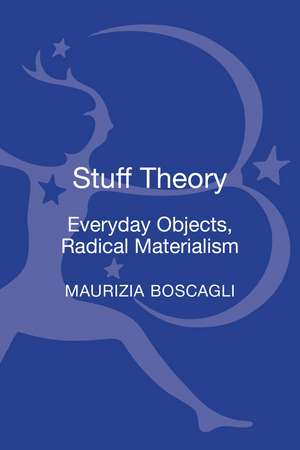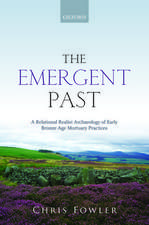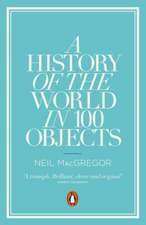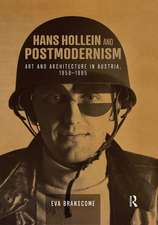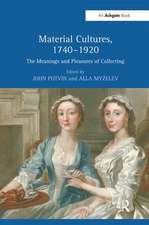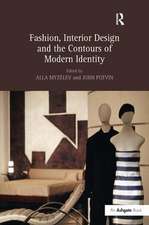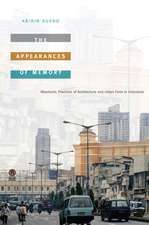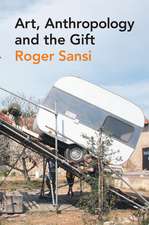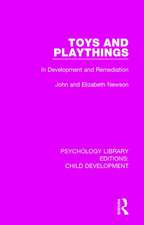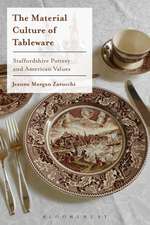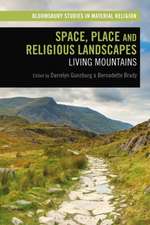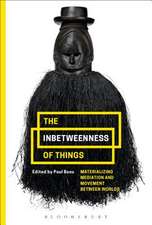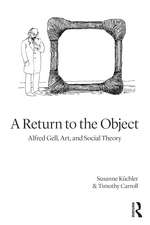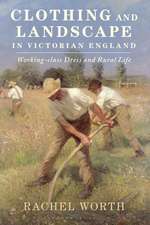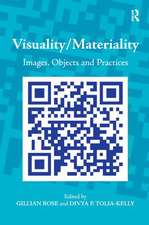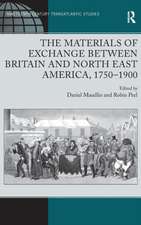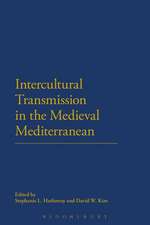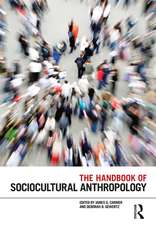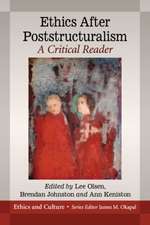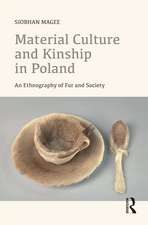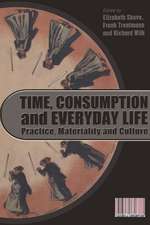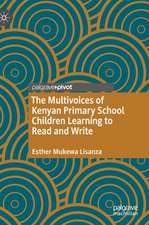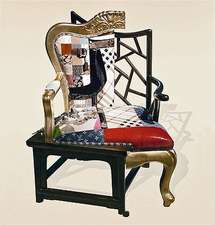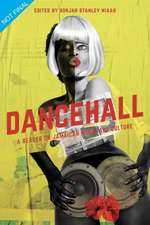Stuff Theory: Everyday Objects, Radical Materialism
Autor Professor Maurizia Boscaglien Limba Engleză Hardback – 21 mai 2014
| Toate formatele și edițiile | Preț | Express |
|---|---|---|
| Paperback (1) | 167.24 lei 43-57 zile | |
| Bloomsbury Publishing – 21 mai 2014 | 167.24 lei 43-57 zile | |
| Hardback (1) | 569.22 lei 43-57 zile | |
| Bloomsbury Publishing – 21 mai 2014 | 569.22 lei 43-57 zile |
Preț: 569.22 lei
Preț vechi: 727.48 lei
-22% Nou
Puncte Express: 854
Preț estimativ în valută:
108.92€ • 114.03$ • 90.12£
108.92€ • 114.03$ • 90.12£
Carte tipărită la comandă
Livrare economică 07-21 aprilie
Preluare comenzi: 021 569.72.76
Specificații
ISBN-13: 9781623562687
ISBN-10: 1623562686
Pagini: 288
Dimensiuni: 140 x 216 x 23 mm
Greutate: 0.52 kg
Ediția:New.
Editura: Bloomsbury Publishing
Colecția Bloomsbury Academic
Locul publicării:New York, United States
ISBN-10: 1623562686
Pagini: 288
Dimensiuni: 140 x 216 x 23 mm
Greutate: 0.52 kg
Ediția:New.
Editura: Bloomsbury Publishing
Colecția Bloomsbury Academic
Locul publicării:New York, United States
Caracteristici
Rereads the significance of stuff, the minor objects of everyday life, in twentieth-century fiction
Notă biografică
Maurizia Boscagli is Associate Professor of English, Comparative Literature, and Feminist Studies at the University of California, Santa Barbara, USA. She is co-director of COMMA, the Center on Modern Literature, Materialism, and Aesthetics. Her first book was Eye on the Flesh: Fashions of Masculinity in the Early Twentieth Century. She is the translator of Antonio Negri's key work Insurgencies. In 2012 she co-edited Joyce, Benjamin, and Magical Urbanism, published in the European Joyce Studies series.
Cuprins
Introduction: Of Jena Glassware and Potatoes-Matter in the Moment1. Homeopathic Benjamin: A Flexible Poetics of Matter2. For the Unnatural Use of Clothes: Fashion as Cultural Assault3. Paris Circa 1968: Cool Spaces, Decoration, Revolution4. "You Must Remember this:" Memory Objects in the Age of Erasable Memory5. Garbage in Theory: Waste Aesthetics Envoi: What Should We Do With Our Stuff?NotesIndex
Recenzii
Boscagli's readings of objects are genuinely exciting ... For anyone interested in consumer capitalism, mediation, the cultural transition from modernity to postmodernity, or objects in art, however, Stuff Theory is a necessary read. Boscagli's writing throughout has verve, and the analyses are sharp, incisive, and often surprising.
The hinge between [modernist and new materialism] is supplied by the endlessly suggestive writing of Walter Benjamin who acts as the richest example of what can be gleaned when these two worlds are entangled ... Boscagli both follows Benjamin and pushes his work into new arenas ... Stuff Theory's engagement with 'new materialism' is wide ranging.
New materialism meets historical materialism, to the expansion and improvement of both. With enviable nuance and sophistication, imaginative verve and critical acuity, Maurizia Boscagli explores the complex, dynamic life of the stuff of capitalism, producing an innovative and original materialism for the twenty-first century. Essential reading.
At one point in David Fincher's 1999 cult film Fight Club, Brad Pitt's rascally Tyler Durden mocks a minor character who states vaguely that in college he studied "stuff." Maurizia Boscagli's dazzling Stuff Theory: Everyday Objects, Radical Materialism shows how Tyler might have taken this utterance seriously: "stuff" is indeed worthy of study. Each page brimming with fresh examples drawn from literature, art, and culture, and carefully informed by intellectual precursors from Marx to the new materialists, Boscagli's theory ultimately illuminates the practice of stuff, and suggests that this practice may be due for revision.
Matter is desire. Whether conceived as an object that can be represented and appropriated or as force whose unpredictability and vitality throws life wide open, matter never leaves us in peace. In this wonderful book Maurizia Boscagli explores how the everyday is shaped by these tantalizing movements of matter. Beyond the capitalocentricism of historical materialism and the detached hype of new materialism Stuff Theory proposes an experimental materialist practice that works with matter to remake the stuff that power and politics are made of.
Boscagli offers an exhilarating genealogy of the commodity in order to open up a questions that neither presuppose the old distinction between subject and object nor revel in the sheer plasticity of things. I especially admire the case that Stuff Theory makes for dialectic as the necessary means of thinking our way through and beyond the 19th-century opposition of materialism (which now includes cyborgian hybrids) to idealism (which has always included aesthetic expression). Bocagli's "radical materialism" shows that only a critique of post-commodity things can tell us how to read them as transformations of "stuff" that expresses the people and selves to which neo-liberalism denies subjectivity.
The hinge between [modernist and new materialism] is supplied by the endlessly suggestive writing of Walter Benjamin who acts as the richest example of what can be gleaned when these two worlds are entangled ... Boscagli both follows Benjamin and pushes his work into new arenas ... Stuff Theory's engagement with 'new materialism' is wide ranging.
New materialism meets historical materialism, to the expansion and improvement of both. With enviable nuance and sophistication, imaginative verve and critical acuity, Maurizia Boscagli explores the complex, dynamic life of the stuff of capitalism, producing an innovative and original materialism for the twenty-first century. Essential reading.
At one point in David Fincher's 1999 cult film Fight Club, Brad Pitt's rascally Tyler Durden mocks a minor character who states vaguely that in college he studied "stuff." Maurizia Boscagli's dazzling Stuff Theory: Everyday Objects, Radical Materialism shows how Tyler might have taken this utterance seriously: "stuff" is indeed worthy of study. Each page brimming with fresh examples drawn from literature, art, and culture, and carefully informed by intellectual precursors from Marx to the new materialists, Boscagli's theory ultimately illuminates the practice of stuff, and suggests that this practice may be due for revision.
Matter is desire. Whether conceived as an object that can be represented and appropriated or as force whose unpredictability and vitality throws life wide open, matter never leaves us in peace. In this wonderful book Maurizia Boscagli explores how the everyday is shaped by these tantalizing movements of matter. Beyond the capitalocentricism of historical materialism and the detached hype of new materialism Stuff Theory proposes an experimental materialist practice that works with matter to remake the stuff that power and politics are made of.
Boscagli offers an exhilarating genealogy of the commodity in order to open up a questions that neither presuppose the old distinction between subject and object nor revel in the sheer plasticity of things. I especially admire the case that Stuff Theory makes for dialectic as the necessary means of thinking our way through and beyond the 19th-century opposition of materialism (which now includes cyborgian hybrids) to idealism (which has always included aesthetic expression). Bocagli's "radical materialism" shows that only a critique of post-commodity things can tell us how to read them as transformations of "stuff" that expresses the people and selves to which neo-liberalism denies subjectivity.
